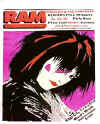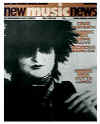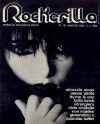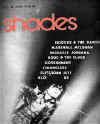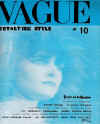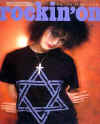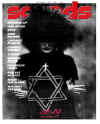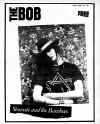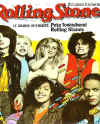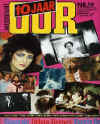|
Enter The Dragon
It’s
an off-the-cuff observation, you understand, but Siouxsie and I spent
our childhood living about a mile from each other, on opposite sides of
a large wood on the border between Kent and London (my claim to fame!).
A 94 bus, if I’m correct, took her into the
legendary Bromley contingent, and some hacks have tried to ascribe
historical importance to her suburb of origin, Chiselhurst.
I can now reveal the place is only noted for it’s
caves, ponds and a wood named after William Pett, who invented British
Summer Time for the benefit of the working classes. Still, it’s a
start, and en route to her PR’s North London office I envisioned some
sort of reunion; she looks the type who’d have joined a particular
gang of infant school Amazons who made Gill Junior’s life an absolute
misery.
But we even fail to connect on that. Having read her
talkative interview with Pomeranian courtier, Herr Veene, I dismissed
the ‘difficult’ tag - and walked straight into a brick wall. She
croaks hello and sits in a forties armchair across from Steve Severin. A
rowdy chorus of PRs bellows and gibbers from a neighbouring room. When
he talks, Severin is so quiet it’s barely audible. Siouxsie speaks in
single sentences as though they were Famous Last Words. Maybe she was
away from school the day they did photographs.
The press release for their upcoming tour says it’ll
be the "last Siouxsie and the Banshees tour". Are they giving
up completely?
Severin: "No, we want to re-think how we tour.
Every time we tour, we try to think of a new place to play. Like just
London, we don’t particularly like to play the Odeon all the
time."
So have they thought of any new ways to play live?
Siouxsie: "Yes! No guitars!" They both
giggle.
Severin: "Last year, with John
McGeoch's situation it was difficult. But now we’re a real band again,
everything’s sorted out. Now we’re a band again, we thought we’d
tour as much as we could until the end of the year and then just think
it out."
So you won’t disappear after this tour?
Siouxsie: "No, we’ve all been doing other
things on our own, as well as what we do together. Steve’s been
producing Altered Images, I think their album’s out in June, and
Budgie and me have put together some songs. Just drums and voice."
For release?
Siouxsie: "Oh yeah, we’ll treat it as a very
viable, commercial product!"
The current single, ‘Spellbound’, isn’t
indicative of the material on the new album, ‘Ju Ju’, they say. Is
the album more inshore or mainstream than the last two?
Miming incomprehension, Siouxsie deigns, "I think
it’s more direct. Much straighter." And smiles, as if to say who
let this klutz in here.
At this point there are a number of optional
explanations for their attitude: they’re cautious, or tired, or lazy,
or suspicious, or snide, or wilful, or they don’t have an original
thought in their heads. Which is it to be, viewers?
We listen to the album on a battered stereo, and
Siouxsie seems to warm when it becomes obvious I like it (perhaps I
should have worn a badge). Its strength and soul burn through the murk
and fuzz of the hi-fi, and it seems a heavier/darker album than
‘Kaleidoscope’.
Siouxsie: "Well, I, um, I mean, we didn’t think
of ‘Kaleidoscope’ as being, ‘this is the direction we’re going
in'. It’s just ‘Kaleidoscope’, full stop."
Something like, say, ‘Voodoo Dolly’ (the album’s
finale and possibly their ‘Horse Latitudes’) sounds very sexual.
Siouxsie: "Sexual? Hah!"
Well it seemed so to me.
Siouxsie: "Each to his own."
You disagree?
"Yeah."
Severin: "I disagree, but I disagree with the
‘Ice Queen of Punk’. I’ve disagreed with that for the last five
years."
Siouxsie repeats that she just thinks it’s more
direct. Let’s try another track.
From ‘Hong Kong Garden’ onwards, it seems as
though they’ve been able to get away with much more than their peers,
taking singles with experimental touches up to the top of the charts.
Few, if any, other bands have swung that.
Severin: "That was always the intention. We
didn’t want a cult following, we didn’t want ‘here we are on
Factory Records...’"
Siouxsie: "We didn’t want to be a shallow pop
group, either."
Would they agree that their music has an avant-garde
edge to it?
Siouxsie demurs, but Severin says, "Well, nearly
all our influences come from that."
Any names? Such ghosts as the Velvets and Doors?
Siouxsie: "Yeah, but I don’t think - I think
most groups who are talked about in comparison with the Velvets or the
Doors, they lack somewhat in imagination, or are just being totally
derivative of those groups. Which I despise, to be quite honest. I dunno,
all those people are influences plus, I dunno, James Brown or Aretha
Franklin, the Jackson Five!"
Do they consider they walk a thin line between the
grim and the populist?
Severin: "I don’t think it’s something that
you think about, consciously."
Siouxsie: "I dunno, I just like it."
What I managed to catch of the lyrics on ‘Ju Ju’
seem to be more similar to the unwholesome psychology of ‘Join
Hands’ than ‘Kaleidoscope’.
Siouxsie: "I just think... the way things come
across can affect you, very much on one hearing. Like
‘Kaleidoscope’, I think that was very light and airy, a lot of the
subjects were light and airy."
Yet dark at the same time?
"Yeah."
Is that controversial aspect intentional - zooming in
on religion, madness, dangerous role games?
Siouxsie: "Well, I’ve never thought that, as a
rule, you should talk about something odd and come across that way
(odd)."
Why?
Siouxsie: "It’s too obvious. It
sensationalises,
it’s overdramatic. Very theatrical."
Yet something like ‘Mother’ is like that.
Siouxsie: "Yeah..."
Is any of this material autobiographical, or just
received information?
Severin: "I think a lot of it’s
autobiographical."
Siouxsie: "Whether it’s things that strike you
or things that happen to you, a personal account, it still affects
you."
How does their audience react to such subjects as
destructive relationships, incest etc.?
Severin: "On a one-to-one basis, backstage,
it’s just one of those things that don’t come up when you talk with
fans."
Yet there must be some point being put across
in those songs - do you get any feedback that says it’s being
received?
Siouxsie: "Yeah, but also it’s just as good
that people can hear something they can enjoy and dance to as
well."
Are there any personal betes noir on ‘Ju Ju’?
Siouxsie: "That makes it sound very much like,
‘What are we talking about this year?’ Y’know, what politics or
what’s in the news that’s topical to talk about. It’s not as
flippant as that."
What about ‘Voodoo Dolly’, its intensity sounds
almost personal. What’s it about?
Siouxsie: "I suppose everyone has their own
personal voodoo dolly which is capable of destroying them. A bad habit,
or something they like but shouldn’t. A vice, most vices; one that’s
hard to control, hard to kick. It’s the same for men with certain
girls, they’re like voodoo dollies, always winding them up, and they
destroy them."
You seem to have a borderline obsession with the
darker aspects of humanity. Have you ever written a song with a ‘happy
ending’?
After a minute or two, she profers, "I suppose
‘Playground Twist', is quite happy at the end, because the baddies are
swinging in the gallows."
Couldn’t it be seen as depressive, that you only
have that side on view?
Siouxsie: "Well, did you get depressed listening
to that album?"
No, but I couldn’t hear all the lyrics.
"Oh, well."
Severin: "I don’t like people using the word
depressing. It’s demanding, if anything at all. You have to sit down
and get involved with it."
(Diplomatically) Do you think it’s a case that
people don’t want to deal with certain subjects?
Siouxsie: "It depends on what depresses you. A
superficial gaiety... or an interest in the wicked things that are done
to people."
And you’d line up alongside the latter?
Siouxsie: "That makes it sound like a
message!"
It doesn’t have to be. You can still be concerned.
Siouxsie: "I like to know if countries are being
wiped off the face of the earth and it’s being kept hush, like
Hiroshima and Nagasaki. I want to know about those things."
Would you say, then, that you’re a concerned person
whose concern is reflected in your work?
Siouxsie: "But not as do-gooders. I ain't no
do-gooder!"
Just like Julie Christie in McCabe and Mrs Miller
- and perhaps intentionally so.
Don’t you think you’re taking a risk, taking that
stand in a business devoid of any principles?
Siouxsie: "I don’t care... I mean, how do you
mean a risk? A risk to myself or a risk to our gaining a bigger
record-buying audience?"
The latter.
Siouxsie: "I’m aware that it’s probably a
risk to our being successful." She doesn’t qualify this further.
Can you define where you stand? You don’t want to
produce pop, you don’t want to go grim. You want your lyrics to have
depth yet not be intellectual. How do you draw the line?
Siouxsie: "I think if you’re convinced in what
you’re doing, I think you’re convincing to others. it’s the
strongest thing anyone has."
Have you always been convinced, or did you gradually
acquire it?
Siouxsie: "I’ve always been convinced... not
about how things turn out, but convinced about what I’m doing."
Do you think the band’s present image is ideal for
you?
Severin: "Our image has altered. Our idea
of our image has altered quite a bit over the last five years. The media
just can’t see beyond this, or don’t want to see beyond this
stereotyped bracket they’ve put us into."
Which is?
Severin: "The ice queen of punk thing.
Depression. Bleak outlook. Punk, as well. The spirit of 1977."
Some chicken-and-the-egg banter ensues over whether
it's the band, media or audience who most contribute to the construction
of an image.
Siouxsie: "I can see a lot of people getting
confused about us."
And how do you get rid of that confusion?
"It’s amusing," is all she says.
Would they line up with all the other conceptualists
who intentionally keep their audience in suspense?
"Yeah!" she laughs. "Keep ‘em in
suspenders!"
Oh dear.
Listening back to their earlier albums, it seems to me
as though they predate a number of current fashionable avant-totems (no
names, although one of the ‘died for you’). Contact!
Severin: "WHOOOH! I’ve been waiting for a
journalist to say that for years!"
Fab! I grin voraciously at him, hands cupped to catch
the verbal torrent.
Severin: "I’ve been hearing ‘The Scream’ in
different people’s music for the past two years. Now they’re getting
into ‘Join Hands’. But it’s not something we want to come out and
say..."
That’s it?
Have the others had to go through anything strange,
like being considered as your backing band?
Siouxsie: "I suppose so, more than with most
groups. With other groups it’s more apparent that they’re a
band."
"It’s just the little things that are most
annoying," she adds.
Like her picture being used all the time, her
name being tagged onto quotes (especially when they’ve come from
someone else). So does her persona unbalance people’s perception of
the band?
Siouxsie: "We sound very strong together, live,
so I don’t think the fact that they’re watching me will affect the
rest of the group. They’re taking it all in through their ears."
She cracks another bad one-liner when asked about band
‘growth’. But Severin takes the cue.
"That’s one of the reasons we’re going to
take time off after the tour and sit down and think."
"This album feels like the first one with a new
band, so we don’t want to rush into another one. We’d just like a
rest, go off to Jamaica... or Surrey."
Is this an aversion to touring?
Siouxsie: "No, I like touring. It’s rather we
want to assess it before we start regretting anything, if you know what
I mean."
I dunno. You’re going to re-assess the future of the
band?
Siouxsie: "Yes. It’d be terrible if next year
we thought we should never tour again, or that we shouldn’t be doing
this. Nothing’s happened, we still want to tour, but we’re just
saying it before it happens."
You’ve spotted some blackspot up ahead?
Siouxsie: "Yeah, and we want to re-assess it
before that happens. It’d be a disaster if it did happen."
Banshees Split Shock Horror Gurgle?
Siouxsie: "We’re not splitting up. It’s just
that if we carried on blindly, possibly it might happen."
Severin: "I’d like to think we’ve done things
in a very unusual way, but it could get to the point where it stops
being unusual. And we don’t want it to end up like Genesis."
They haven’t found an alternative as yet, but feel a
growing distrust for the rock’n’roll touring circuit/circus. Maybe,
just maybe, the likes of Cabaret Futura point the way. They and we will
find out late this year or next.
They’ve obviously thawed a little (if he didn’t
speak so quietly, Severin would be more in evidence here) but by now my
brain is wheezing towards a seizure. Any pearls of wisdom they’d like
to impart?
Siouxsie: "I hate talking about what we will be
doing, because we just don’t know."
Severin: "...I hate all this jive... what sort of
books you should read with our music..."
Kafka!?
Steve thinks Janet and John would be more apt. But why
this fear or dislike of intellectuals?
Severin: "When they want to slag us off, that’s
when they start intellectualising it. The good reviews are usually
emotional."
Siouxsie: "I don’t like people who go through
the ritual of being intellectual. They really show up their stupidity. I
like clever people but the people who have a reputation for being
intellectual are just very boring." And fixes me with a ‘Watch
It’ stare.
But don’t you think you’ve given people enough
ammo to start writing theses on the Banshees?
Siouxsie: "Well, they can go and do their
homework."
Severin: "You could also write a 10,000 word
thesis on the effect of Marc Bolan on the popular consciousness. We
don’t want to steer it into that, neither do we want to steer people
away from it."
Perhaps they’re in two minds about it or, more
likely, don’t like talking about it for fear it might go pop! in their
faces.
I’ve no fear the Banshees will go pop!, but I am
in two minds. I came away still admiring their music and respecting them
as individuals, but angry to the extent of wanting to slag them off for
putting me through this preposterous ritual of put-ons, petulance and
deity/supplicant role playing.
You can only allow The Artist so much leeway before
you might as well give up and ask what they eat for breakfast.
Their PR says they’re extremely shy, unsure of the
media and - quite probably - modest. But in my book you get as good as
you give. I’m prepared to put myself on the line, Siouxsie.
Are you?
John Gill 20/06/81
BACK
TO INTERVIEWS/ARTICLES INDEX
|
